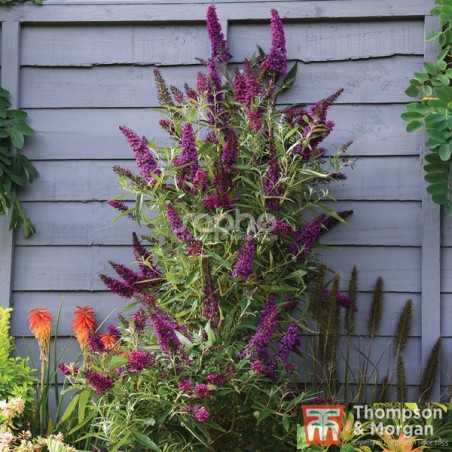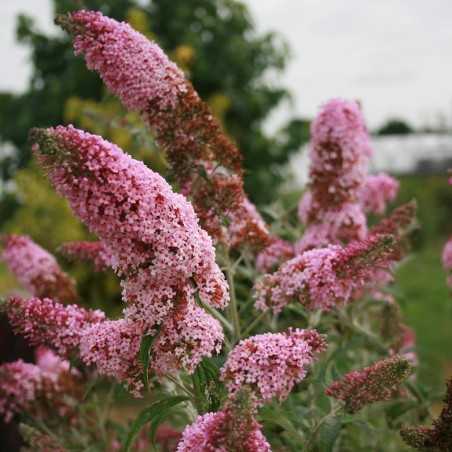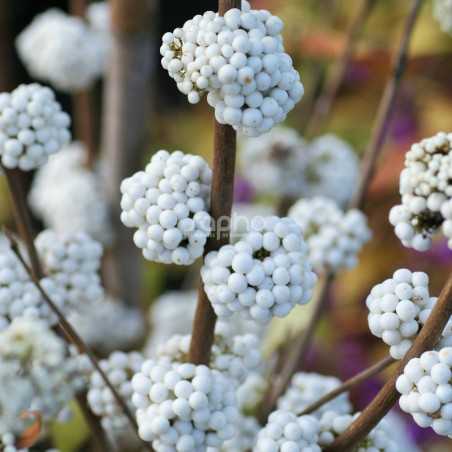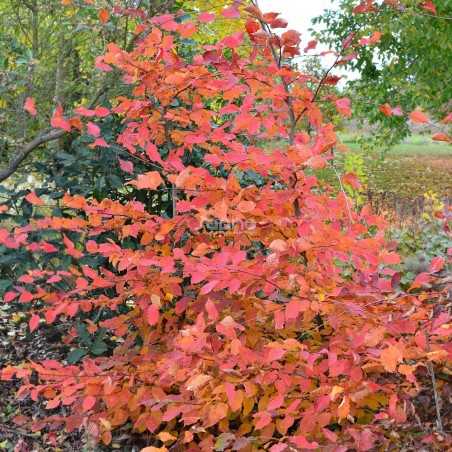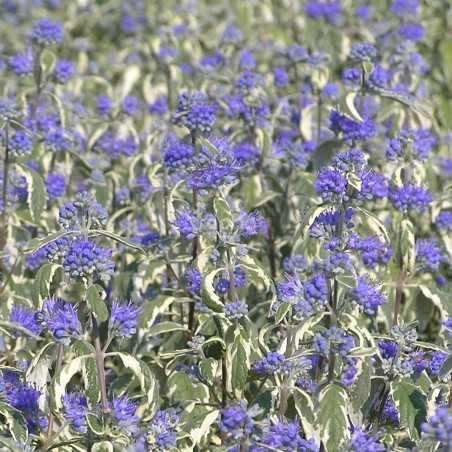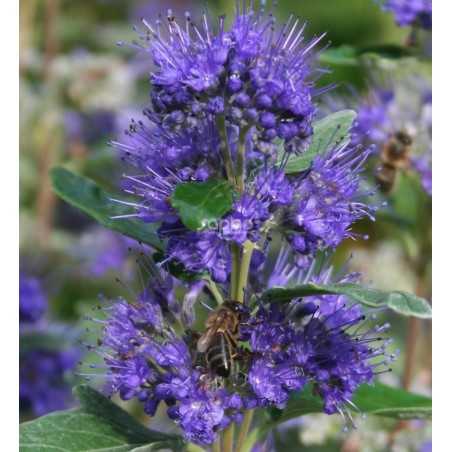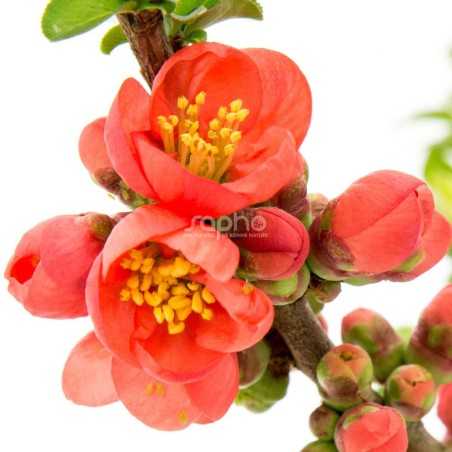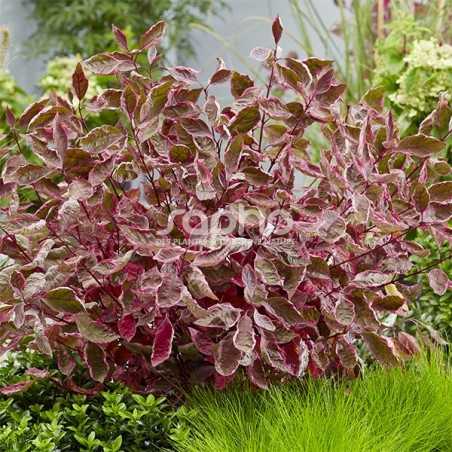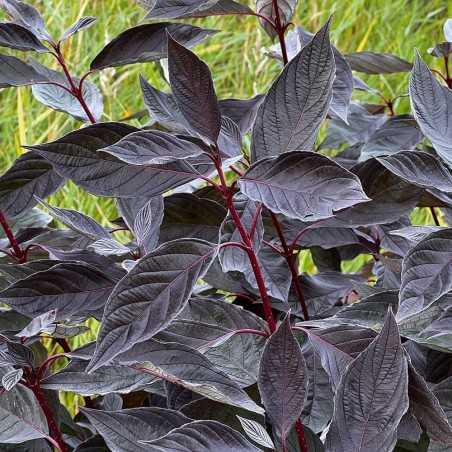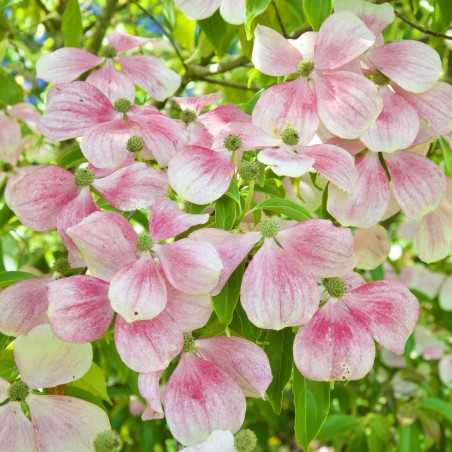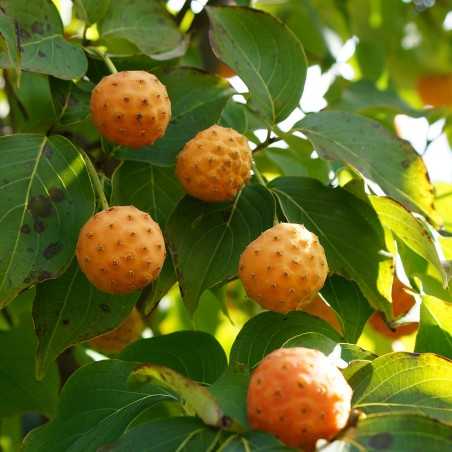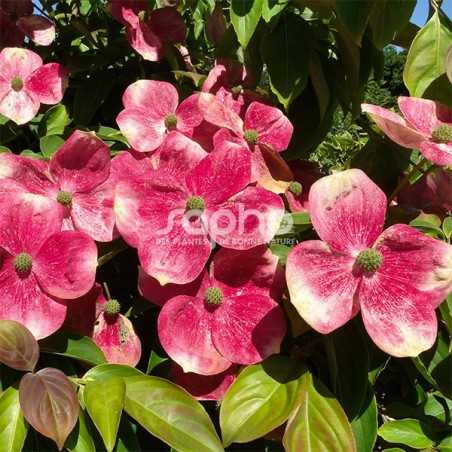A tower of flowers for butterflies!Buddleia BUTTERFLY TOWER is remarkable for its highly original structure growing in the form of a tight column. Its foliage is dark green and neatly lanceolate; its flowers form long upright spikes of deep purple. Each flower is a rich source of nectar, attracting bees and butterflies throughout the summer. A hardy shrub, easy to cultivate and compact, BUTTERFLY TOWER requires less space than traditional Buddleias. As a result it may be grown in isolation or in hedges as an excellent, colourful screening shrub.
Filter By
Foliage
Position
Categories
Menu
Trees and shrubs
An original colour for this compact butterfly tree!
This butterfly tree has a naturally dense, branching habit, suitable for small gardens and container cultivation.
Its bright pink blossoms appear at an early age, from early summer to autumn, if pruned after each wave of flowers.
Hence its name, this plant is very melliferous and will attract many insects to your garden!
A callicarpa with brilliant snow-white berriesA highly decorative and unusual display! Callicarpa Magical® Snowstar lights up the garden in the autumn with abundant clusters of sparkling white berries spread along the vertical stems. These berries do not become brown; they remain colourful until the end of the season. A higly ornamental shrub for the garden, it can also be used to produce gorgeous bouquets of cut branches.Magical® Snowstar is a densely branched shrub, which can reach a height of 2 m. Pruning is recommended at the end of winter to encourage the production of new stems. Very easy to grow, it is also fully hardy and resistant to drought. A sunny exposure will promote fruiting.
A flamboyant autumn
The spring and summer foliage is pure green. At the very beginning of autumn the leaves are coloured in different shades of bright red and orange. These tints last several weeks, until mid-November. Then the leaves turn brown. Being marcescent, they stay all winter long.
The flowers in form of yellow catkins appear in March.
This charming selection is of rapid growth, close to this type of plants. It is ovoid-shaped but the variety tolerates pruning very well and can therefor be grown in a trimmed hedge.
ROCKHAMPTON RED 'Lochglow' is noticeable from far in the autumn and adds a flamboyant and bright note, be it in rows or in hedges.
Its variegation sets off well its blue flowers.'White Surprise', a selection of variegated Caryopteris surprises with its very bright, white rimmed foliage.The shape is compact and round, its growth is good.The flowers in August -September, often continuing into October, are light violet blue.Its moderate dimensions, its ornamental foliage from spring onwards, its long flowering period in summer make 'White Sunrise' an interesting decor plant for the garden. It goes well with GRAND BLEU ® and its foliage and flowers of a deeper colour.Trophies: Bronze medal at PLANTARIUM 2007 (Boskoop - Netherlands)
The bluest of all Caryopteris - GRAND BLEU® has been a STAR shrub for nearly 15 years.GRAND BLEU ® is a dense, bushy rounded shrub. Its growth is regular. It is suitable for container growing.Its abundant and late flowering spreads from August to October. The flowers have long stamens and are of a remarkable deep dark blue, which is highlighted by the bright, dark green characteristic foliage. Like all Caryopteris, the foliage gives off a turpentine smell when touched.GRAND BLEU ® attracts attention, when it is associated with shrubs or brightly coloured perennials. It is very suitable for planting in large quantities in public spaces, or as a sole shrub in gardens of moderate size.Trophies: Bronze medal at PLANTARIUM 2007 (Boskoop - Netherlands)
A thornless chaenomeles!
Unlike many other varieties of Japanese quince, Chaenomeles 'Red Kimono' bears no thorns, a great plus! From the end of winter, this shrub brings colour and cheerfulness to the garden with its brilliant, bright red flowers, held on bare stems. The glossy green foliage appears later. It has a rapid growth rate, and an erect habit. Requiring little maintenance, it is equally suitable as an isolated specimen, in flower beds or in mixed borders.
Care :
Can be pruned if necessary, but always after flowering
A miracle of colours, all year long !
This superb variety has bright, colorful variegated foliage, which falls in autumn and reveals its highly decorative red wood in winter.
The very pink, tricolored young shoots evolve to green with creamy white and pink margins. The pink variegation returns in autumn, turning crimson to garnet-pink (even more intense in colder climates).
It's a highly branched plant, which structures very well and looks great in pots.
Year round attractive and spectacular autumn colours
Dark green spring leaves,
Foliage turns dark purple in summer, ending black at fall
Velvety grey hue on the foliage, especially on the underside, highlights the dark plant
Red stems in autumn/ winter
More upright growth than other Cornus alba, can be used as hedge
Robust, easy-growing, little-maintenance, can adapt to various soil, dry or moist
The great elegance of Cornus hongkongensis mixed with cornus kousa's assets
This Cornus has larger, more colorful flowers, evolving from ivory to pink, then light red. Fruits are twice as large, green, then turning red.
What's more, it stands out for its young shoots and coppery winter foliage, which add a touch of originality!
It's a vigorous plant, with an upright habit and flexible side branches, which is easy to grow and forms perfectly on an axis.
Perfectly adapted to mild climates, it's a real showstopper in the garden!
The elegance of Cornus is enhanced by the originality of its fruit
This variety blooms abundantly with white flowers from late May to early June.
Its decorative fruits, visible from afar, have original colors: yellow evolving into pumpkin-orange when ripe.
Its foliage also changes from green to orange-yellow in autumn.
This large shrub is easy to grow and has a flared habit when young.
Ideal as an isolated plant in the garden.
Spectacular for the size, abundance and changing color of its flowers!
This Cornus is distinguished by its longevity and abundant flowering. Its flowers change color with the seasons, from light salmon to bright pink to red.
In autumn, large red berries appear and persist until hard frost.
Its shape makes it ideal for production.
Its vigor and upright form with flexible branches make it an ideal shrub or small tree for large gardens and landscaped parks.
nb: color evolution may vary according to region and climate.

